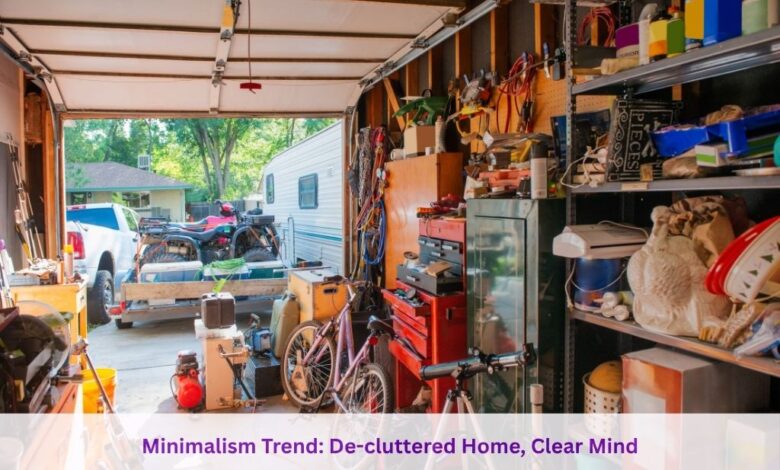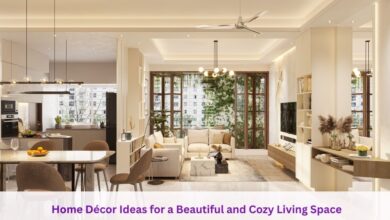Minimalism Trend: De-cluttered Home, Clear Mind

In a world defined by excess whether in purchasing, obligations, alerts, or digital clutter a quiet revolution is going on: minimalism. Cantered on conscious living, this lifestyle movement goes beyond merely owning less stuff. Making room for clarity, goals, tranquillity, and freedom is the focus here. The concept of “less is more” has never seemed more pertinent as people all over the world reassess their connection to material possessions. Let’s investigate how minimalism not only changes houses but also aids in mind de-cluttering. The Origins and Evolution of Minimalism The idea of minimalism has been in use for millennia. The concept of living simply has long been a spiritual and intellectual quest, from the lessons of Buddha to the habits of Japanese Zen monks. However, minimalism originated as an artistic movement in the 1960s when artists rejected intricate patterns and embraced basic forms, open space, and clean lines. Jump to the 21st century, minimalism developed from an aesthetic approach into a lifestyle philosophy. Mainstreaming of the movement was aided by books like The Life-Changing Magic of Tidying Up by Marie Kondo and films like Minimalism: A Documentary About the Important Things.
Ironically a source of visual richness, social media evolved into a breeding ground for sharing aesthetically pleasing minimalist areas white walls, hardwood flooring, a single plant in a corner, and three items on shelves. Minimalism is not only about appearances, though. It is a change in perspective.
The growing interest in minimalism is no coincidence. It’s a response to the pandemonium all around us. Digital Overload: Continual alerts, emails, and online media have generated psychological tiredness. People are wishing for quiet. With e-commerce growing, impulsive buying became standard operating procedure. People finally started questioning: “Do I really need all of this? “Clutter adds to stress and mental health crises.
Many have been driven toward simplicity by their wish for mental quiet. Sustainability: Growing environmental consciousness caused people to live more deliberately and use less. Lockdowns compelled people to face their possessions and surroundings, hence reflecting the pandemic. Home was reflecting mind. Here minimalist is more than a design; it’s a survival mechanism in a hectic environment.
The Power of a De-cluttered House
In our physical environment, minimalism causes one of the most obvious changes. Entering a basic room is like to inhale deeply. Energetically light, it feels clean not only with regard to dust or filth.
Benefits of a De-cluttered Room:
1. Lower Stress: Studies reveal that a cluttered environment raises levels of cortisol the stress hormone. A neat room calms the nervous system.
2. The brain becomes less diverted and more creative when there is less visual clutter.
3. Reduces cleaning, searching, and easier maintenance by fewer items helps save time.
4. Enhancing Creativity: Open areas sometimes spark creative thinking.
5. More appreciation: fewer possessions usually mean more worth. Minimalism does not call for vacant rooms or give up your comforts. Intentional space curation entails choosing every item you keep either to serve a purpose or to bring you happiness.
At home. Initially, changing to minimalism can be scary. You do not need to discard all over a weekend.
It’s a deliberate, drawn-out procedure. Step-by-Step Instructions:
1.Pick one spot: a drawer, a shelf, a corner. Purge it. Sort what you don’t use from what you do. Dispose of the rest, recycle it, or donate it.
2. Sort by Category and De-clutter. Inspired by the KonMari approach, organize goods: clothes, books, documents, kitchenware, décor. Work one classification at a time.
3. Ask the proper questions. Do I often use this? Does this have any worth in my life? Today would I get this again? This item here is motivated guilt or obligation?
4. Apply the one in, one out approach. Remove one item for every new thing you bring. This assists in preventing future chaos.
5. Clear Empty Space Feel no need to fill every shelf or nook. Let your house breathe.
6. Clean digitally. Your digital world also follows minimalism. Clean your inbox, arrange your files, delete unnecessary apps, and cut your screen time.
Minimalism in Mind: The Psychological Change
Your mind starts to follow as your surroundings clear. Minimalism is a mental exercise; it is not only a physical act. It shows you how to stop before you act. Before buying. Before answering affirmatively. It changes the direction of attention from what you possess to who you are. Mental Advantages: Intentional living aids in less spontaneous behaviour and better decision-making. Less Anxiety: A minimalist approach to commitments, social life, and habits reduces the feeling of being overwhelmed.
Gratitude and Contentment
You come to value the enough in your life instead of constantly longing more. Minimalism fosters conscious living. It makes room for reflection, gratitude, and peace.
Dealing with the emotional load connected to goods is among the most difficult aspects of adopting minimalism. Often felt priceless are gifts from loved ones, things connected to memories, or purchased during a difficult period. The reality is that memories reside in you, not in the items. Giving up does not necessarily equate forgetting. It implies confidence in the strength of the recollection independent of the physical item. Take a shot; scribble a note; but don’t let the past imprison your present.
Minimum is not only for the affluent. One often said criticism is that minimalism is a privileged way of life that less is simpler to live with more. This perspective, however, misses the essence of the movement.
Minimalism is not about aesthetic, minimalism with designer furniture and white walls. It’s about purposeful living, which everyone may adopt regardless of income.
Minimalism is in fact a way of survival for many impoverished families, not a choice. The key is to move from unconscious simplicity to empowered simplicity where your decisions reflect your values.
Minimalism beyond the home
The repercussions of simple living reach well beyond your four walls.
1. Minimizing Relationships Fewer but deeper links: Eliminating harmful people, minimizing surface contacts, and allocating time to significant relationships.
2. Schedule Minimalism Over hectic schedules, give quality time, rest, and meaningful labour first priority. Say “no” more. Stop glorifying busyness.
3. Consumption’s minimalism Purchase fewer. Purchase better. When practical, go for sustainable, ethical products. Prioritize need and endurance above trend and whim.
4. Minimalism in Ideas Clear the mind. Journaling, meditation, and mindfulness enable you to recognize superfluous mental noise and internal clutter. Nature in Minimalism Nature is the ideal minimal instructor. Trees gather leaves not to keep them.
5.Nature streams; it discards; it refreshes; a river gathers nothing. Bringing nature into your minimalist path can help to maximize the advantages whether via natural light, indoor plants, fresh air, or outdoor walks. Nature reminds us that simplicity is beautiful.
Difficulties and Myths
Minimalism isn’t always simple. Emotional Resistance: Some stuff will be challenging to release. That’s alright. Work at your own pace. Social Pressure: Others might not grasp your decisions but adhere to your principles.
Perfectionism: Don’t get fixated on “doing it right. ” It’s about calm life rather than flawless spaces. Minimalism is not a race. There is no prize for owning the fewest. It concerns independence, not deprivation.
Minimalism is personal; a gentle reminder. There is no one-size- fits-all answer. Ten pairs of shoes or merely two may be present in your interpretation of minimalism. It may entail living in a modest apartment or just altering your buying patterns. Your food, your relationships, or your calendar may all show your reflection. The point is: you decide what counts. You specify what enough is.
Last Ideas: The Clear Mind in the De-cluttered Home Your mind becomes clearer when your house is peaceful. Your heart is not overburdened when your shelves are not overflowing. Often you live with more when you live with less: more peace, more freedom, more time, more connection. Minimalism is not about robbing life of happiness. It’s about creating room for delight to come in. Begin right away.
One drawer, one corner, one behaviour at a time. You have to let minimalism; you need to chase it not. And by doing so, you could just discover the emotional tranquillity and mental clarity you were seeking without even knowing it.
Because ultimately, a de-cluttered house may simply be the route to a de-cluttered soul. Adopting Minimalism: a road, not a destination Understanding that minimalism is a personal path unique for each individual not a ultimate objective to be achieved as we bring this exploration to a conclusion is essential.
It’s not about fitting all your stuff into a suitcase or designing an Instagram-worthy living room. It is about discovering what really matters and letting go of all else that no longer benefits your life. From external distractions to inner clarity, from chaos to peace, minimalism encourages us to move our attention from acquisition to appreciation.
Frequently we start to solve emotional and psychological knots that have been silently holding us down by removing physical debris. In this act of letting go, we find control, direction, and calmness once again. One of the best features of minimalism is that it may be implemented little by little.
Overnight you do not need to completely change your life. Small changes like de-cluttering a drawer, unsubscribing from unwanted emails, or establishing a calm space for meditation can start the seeds of mindfulness and harmony. You can see how much lighter you feel not only in your house but also in your heart and mind the more you let go. You’ll come to see that joy is not found in the following acquisition, upgrade, or possession.
Rather, it dwells in the present, in space to breathe, in room to grow, and in the independence to live deliberately. Minimalism softly whispers, “You are already enough,” in a world that constantly urges us to do more, buy more, and be more. Consider minimalism first, whether you are looking for calm among the noise, clarity among the confusion, or simply a little more room to stretch and grin. Not because it’s fashionable, but rather because your well-being, your time, and your inner tranquillity are valuable. Ultimately, a de-cluttered house is an invitation to a clearer, lighter, and more meaningful life rather than only a neat area.




